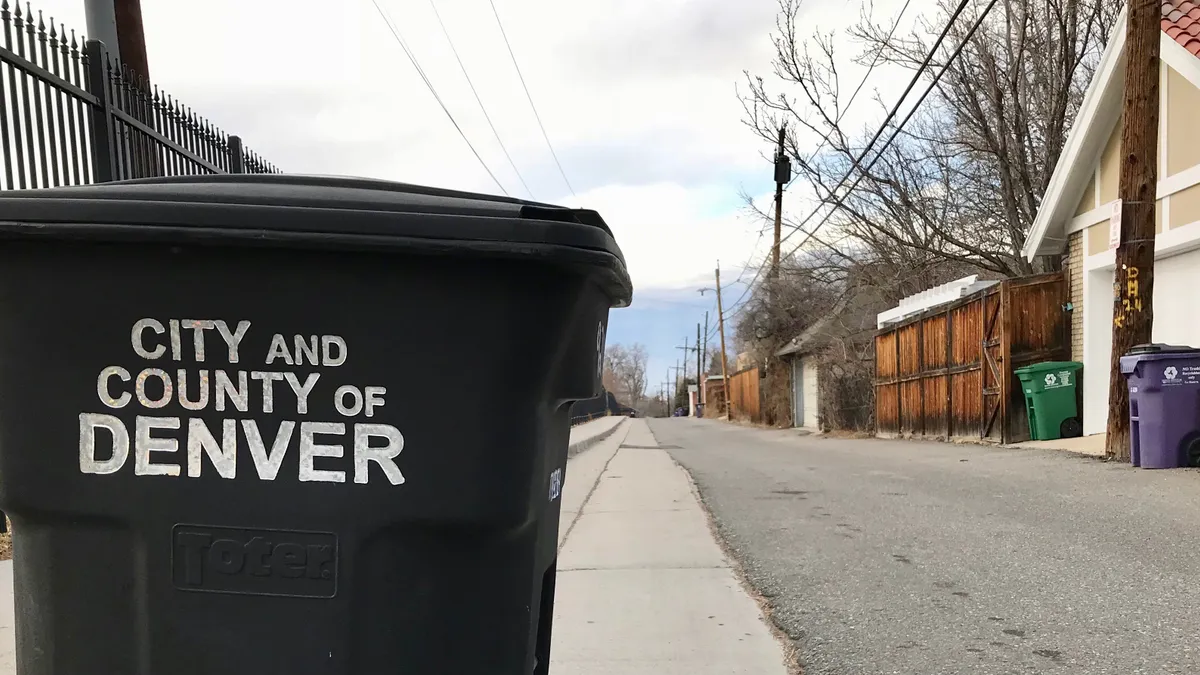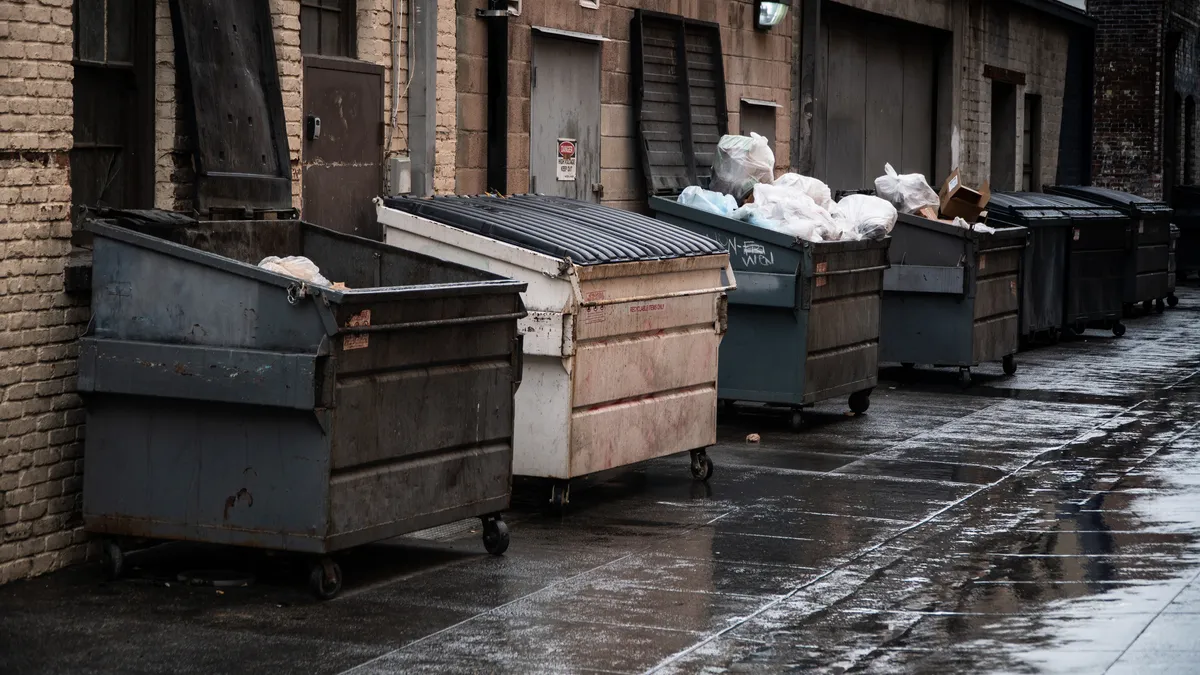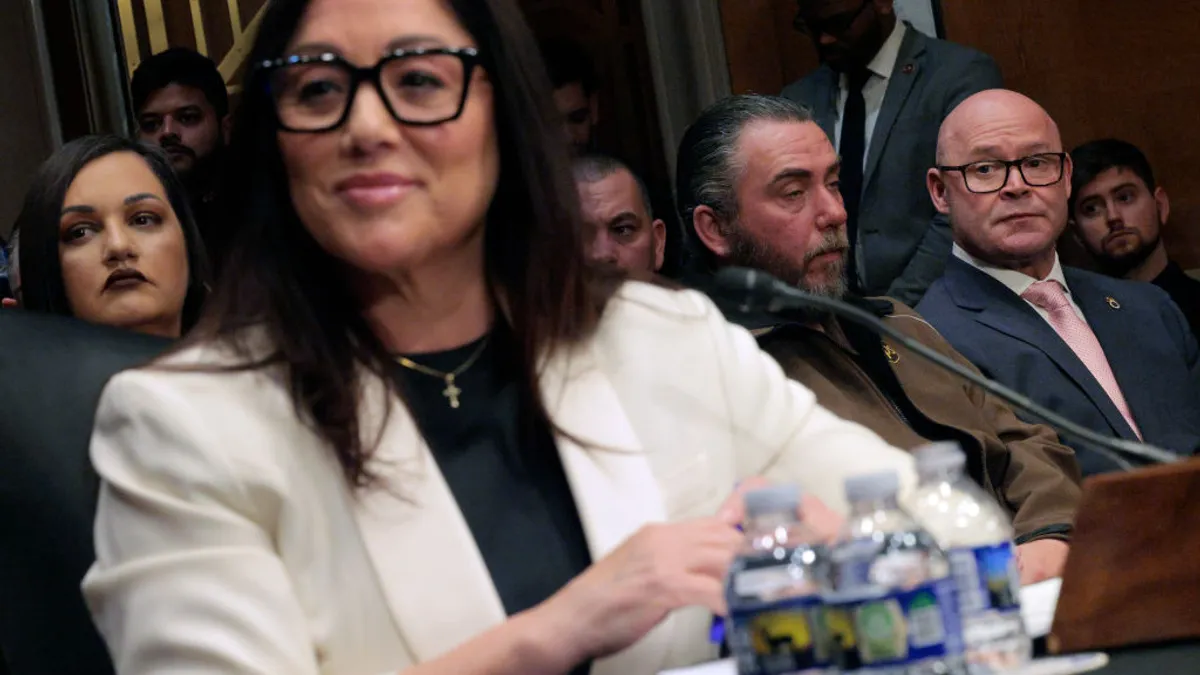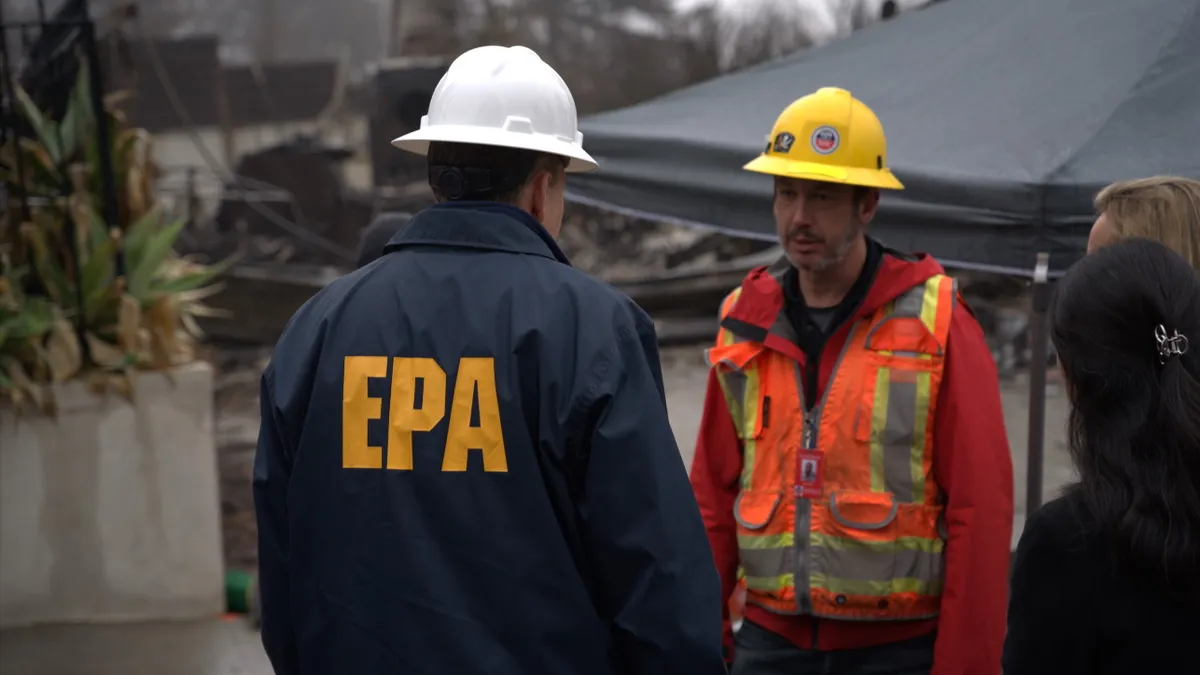Editor’s Note: Waste and recycling are inherently local issues in the United States, and we’re looking for new ways to highlight how these stories fit into broader trends. Send us your tips or feedback at waste.dive.editors@industrydive.com.
As hiring headaches continue, new approaches to recruiting candidates emerge
Add the city of Denver and its suburbs to the list of U.S. urban hubs suffering from trash and recycling pickup delays due to an insufficient number of commercial driver’s license-holding drivers and helpers. The Denver Post reports that the city is seeking to hire additional sanitation workers after pandemic budget cuts and allowing vacancies to remain unfilled, according to a Department of Transportation and Infrastructure spokesperson.
Meanwhile, in St. Louis this week, dump trucks are assisting in picking up waste that piled up following holiday weekends and amid a worker shortage. The city is temporarily commingling garbage and recycling. “Physically, my workforce had no more to give,” Refuse Commissioner Todd Waelterman said regarding the cutback, as reported by the St. Louis Post-Dispatch. And in Atlanta, the city is 40 laborers short, so yard waste pickups will be reduced for now.
At the same time, there are examples of private and public employers taking concrete steps to expand who is employed in waste and recycling, in part by reaching out to more women and people of color for training and participation opportunities.
Portland, Oregon, Bureau of Planning and Sustainability Coordinator Arianne Sperry presented this week to the Metropolitan Washington Council of Governments Recycling Committee about Portland’s steps to better include and promote opportunities for women and minority workers and companies in the waste sector, including through its Waste Equity Workplan. Revenue to be generated through a nearly finalized extended producer responsibility (EPR) law in the state is also poised to help ensure living wages for industry workers, and state officials plan to coordinate with Metro on their efforts.
Sperry explained how the city examined the “many hurdles,” both historically and currently, to getting into the waste hauling business, following “decades of discrimination and exclusion.” That process in part led the city to opt to restructure its contracts to include more smaller companies as opposed to consolidating it among a few large ones.
“A lot of folks that are coming to the table say: ‘Why should we trust you? We've been burned by the city so many times.’ And so building relationships has been a key piece of this,” Sperry said.
Other programs have popped up elsewhere. Portland’s Arrow Sanitary Service, now owned by Waste Connections, recently executed the first round of a 12-week driver training program that involves not just CDL training, but also container reading, route sheet reading and truck cleaning. In a similar vein, Virginia Beach, Virginia’s Department of Public Works created an apprenticeship program that in part prepares participants for a CDL test, while also offering “soft skills” training through a community college’s job skills program.
While hiring may prove challenging, the numbers show the sector’s jobs are growing compared to other industries, at least in Connecticut, per a report from the Hartford Courant this week. In Philadelphia, where there have been complaints of missed trash pickups for weeks on end, Mayor Jim Kenney said the city has managed to hire 70 additional workers for its Streets Department.
Recycling Is Infrastructure Too partners release plan
The partner organizations that earlier this year formed the Recycling Is Infrastructure Too campaign on Thursday released their first infrastructure plan, proposing 50 initiatives costing $16.3 billion over three years to reduce waste, encourage reuse, and bolster recycling and composting. A few examples include investing in infrastructure for edible food capture and lithium-ion batteries; setting up reuse warehouses and centers and promoting reuse and repair businesses; and establishing a national EPR framework for hard-to-recycle items.
Market development is an important category throughout; ideas include creating a national pay-as-you-throw system, adopting national beverage container deposit legislation, and establishing an Office of Waste Reduction Innovation and Recycling Market Development within the U.S. Chamber of Commerce.
Created by the Institute for Local Self-Reliance, National Recycling Coalition and Zero Waste USA, the plan proposes a range of potential funding sources, including EPR programs, federal fees on non-recyclable packaging and other waste-creating products, eliminating subsidies for the fossil fuel industry, and charging landfills and incinerators per-ton fees to help support recycling initiatives, for instance.
It’s not the only recent infrastructure-focused proposal in this space; some of the ideas overlap with pitches put forth over the past year in The Recycling Partnership’s “Paying It Forward” report, the U.S. Composting Infrastructure Coalition’s platform, and the multistakeholder Food Waste Action Plan.
More news from around the country:
-
Chicago this week unveiled a new waste strategy that aims to bolster recycling programs, including for organics and textiles, and sets the city up to explore the potential for commercial waste zones and the impact of EPR legislation. (Waste Dive)
-
Baltimore this week initiated food scrap collection at five sites as part of a months-long pilot program. Meanwhile, food scrap collection options in Madison, Wisconsin, are being eliminated; the city is closing three dropoff sites because the digester that was accepting that material is now focusing on cow manure.
-
Two recycling dropoff sites are also shutting down in Columbia, Missouri, due to improper disposal of materials. (KOMU)
-
Texarkana, Texas, is seeing a high rate of contamination two weeks into resuming residential curbside recycling, according to Waste Management, after having halted the service in 2020. (Texarkana Gazette)
-
Republic Services, which has serviced Flint, Michigan, for eight years, did not submit a bid for the city’s upcoming waste hauling contract. Republic is currently finishing out a 90-day contact extension there, after the existing contract expired. City officials previously criticized the quality of Republic’s service, noting delayed pickups, which the company attributed to challenges from a labor shortage. (ABC12)
-
Boston schools are poised to play a potentially important role in the city’s efforts to boost textiles recycling. (Boston.com)
-
New York City’s Department of Sanitation is sending eight collection trucks to assist neighboring Mt. Vernon, after the smaller city declared “a public health and safety crisis” due to significant maintenance issues with its own fleet. (PIX11)
-
Fort Myers, Florida, is landfilling recyclables in some areas, prompting outcry from some residents. City officials say that practice occurs in neighborhoods undergoing construction, with the city only sending a garbage truck due to potential safety concerns. (WINK News)
-
In one part of Hawaii, certain beach day staples – polystyrene foam coolers and ice chests and disposable bodyboards – may soon no longer be allowed. Maui County leaders are looking to add those items to a list of plastic and foam items banned because their materials may be harmful to the environment. (The Maui News)






















